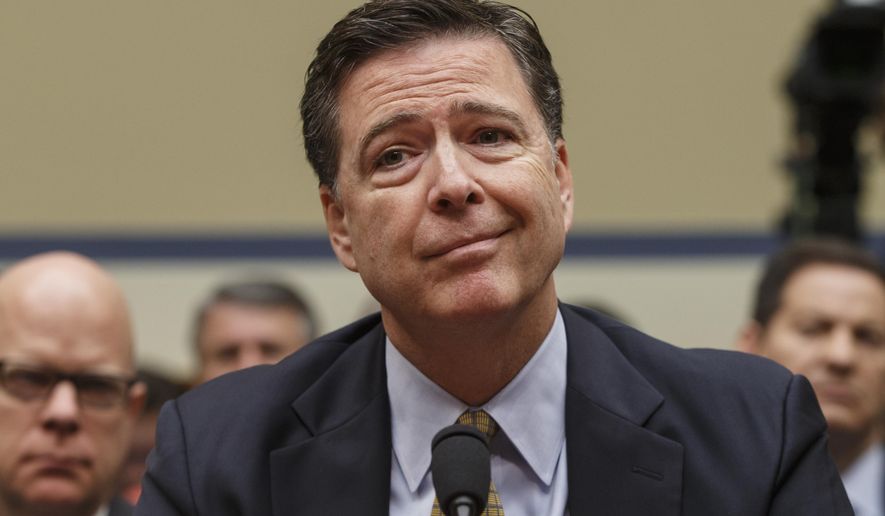OPINION:
Current and former agents of the once most respected name in law enforcement must cringe in helpless disbelief every time a news headline crosses their computer containing the letters “FBI.” “What is it this time?” They must think to themselves as they discover another verbal lashing by pundits and politicians in the furtherance of the day’s agenda, but under the guise of patriotism and truth. Since when did the men and women of the FBI become a weapon of war in politics? What did they do to deserve this?
Those who love the FBI should never do so at the expense of remaining objective. Authentic love requires having the ability to tell someone when they are wrong, instead of pretending they can do no wrong. The FBI did wrong. This agency, made up of fallible people, has made mistakes, but former FBI Director James Comey made it political, whether he intended to or not.
James Comey entered the FBI with a reputation as a man of high integrity and a strong moral compass. Despite what many well-respected current and former leaders of the FBI say about Mr. Comey as a righteous and honorable individual (and that, he may be), he delivered three self-inflicting blows to the FBI that sent cascading consequences through the halls of every FBI office in the nation and around the world. The impact of Mr. Comey’s errors were felt immediately and the ultimate outcome was predicted by many experienced agents. Though hindsight is 20/20, in this instance it has illuminated nothing that foresight would not have revealed.
The first blow was the selection of Andrew McCabe as deputy director of the FBI. This decision began a massive two-year avalanche that to this day the FBI has struggled to dig itself out from under. Tragically, Mr. Comey failed to consider how appointing the spouse of a recent Virginia State Senate candidate might be perceived.
He failed to consider how it might look to have the deputy director, with authority over public corruption investigations, in pictures with donors and politicians who might also be subjects of investigations. He failed to consider how it might look to have people whom the FBI might have under investigation donating money to Mr. McCabe’s wife’s campaign months before Mr. McCabe was appointed deputy director.
Nobody whose spouse has political aspirations, regardless of party affiliation, character, or intent, should be in a position of authority over public corruption investigations. Bottom line, the optics were horrible, and Mr. Comey and his advisers should have known better. Ultimately, he neglected to consider that the appearance of corruption is as bad as corruption itself.
The second blow came when Mr. Comey provided details of the Hillary Clinton email investigation during a press conference. This was an unprecedented move. The FBI historically does not comment publicly on investigations for many reasons, not the least of which includes, the need to maintain the integrity of the investigation (or related investigations), the protection of the innocent, and the reliance on the judicial system to establish guilt, not the general public.
The third blow delivered upon the FBI was Mr. Comey’s email to Congress announcing the reopening of the Clinton investigation days before the presidential election. Taking overt law enforcement action against a politician that might reach public awareness within days, weeks, or even a few months prior to an election conflicted with the FBI’s posture of diligently avoiding the appearance of being used as a tool to influence voters.
Upon closer analysis, it becomes clear that this third blow was the natural result of the second. Mr. Comey claimed to have been concerned with appearances assuming Mrs. Clinton won the election and the world later discovered the FBI had reopened the email investigation, so he felt transparency was the best way forward. However, the need for such a calculation only became necessary when Mr. Comey changed the world’s expectations with his second blow. If Mr. Comey said nothing in the first place, the world would have expected nothing.
Like an escalation of imprudence, this was arguably the worst of the three blows. It was the proverbial “last straw” that solidified in many people’s minds the belief that the FBI had become politicized. But for which side?
Mr. Comey’s public declination of the Clinton investigation appeared political for the benefit of Democrats, but this third blow appeared a political move for the benefit of Republicans. His ability to provoke both sides of the aisle in such a short amount of time is the best evidence that he was not intentionally acting political, but rather, masterfully putting together a series of unconscionable decisions. Thus, James Comey was less corrupt and more unfit for service.
Mr. Comey’s unwillingness to meticulously adhere to protocol resulted in an unhealthy culture at the executive level, as evidenced by the recent controversy surrounding McCabe’s dismissal from the FBI and the indefensible politically charged text exchanges between Peter Strzok and Lisa Page.
Despite the impactful blows the FBI has taken, the tireless resolve of the men and women of the FBI is unwavering and eternally vigilant. No one director — or deputy director — can undo the FBI’s staunch commitment to broad ideals and the execution of the mission, a commitment the FBI has adhered to over its 110 years of service to the country.
• Jeff Cortese, is a financial crimes manager in the private sector and former acting chief of the FBI’s Public Corruption Unit




Please read our comment policy before commenting.